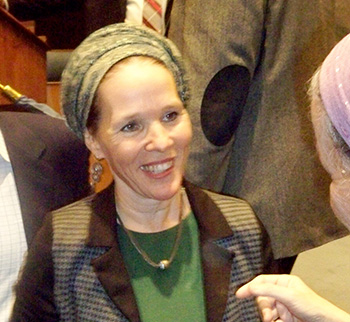MONTREAL — The mother of an Israeli teenager murdered by Hamas terrorists in June pleaded for Jews not to be vengeful, though she does believe that Israel’s operation in Gaza this past summer was a “very justified war.”
Rachel Frenkel’s son Naftali, 16, was one of three boys kidnapped on June 12 in Gush Etzion on the West Bank as they were hitchhiking home from their yeshivot.
“It was a no-brainer,” said Frenkel in an address Oct. 23 at Congregation Beth Israel Beth Aaron of her immediate condemnation of the revenge killing of an innocent Arab youth in Jerusalem a couple of days after the deaths of the three Israeli boys were confirmed on June 30.
“We couldn’t imagine Jews did that… We were horrified. It’s against everything we stood for,” Frenkel said.
“We felt no parent should go through what we were going through… There is no difference between the blood of an Arab boy and the blood of a Jewish boy.”
Her address was the kickoff for Montreal’s participation in the Shabbat Project, an international effort, now in its second year, to encourage as many Jews as possible to keep the Shabbat of Oct. 24-25 in the traditional manner.
Frenkel and her husband, Avi, were still sitting shivah when the arrests of the three alleged kidnappers and murderers of 16-year-old Mohammed Abu Khdeir were made. She asked her brother-in-law to speak on behalf of the family, and when they got up, she and Avi spoke out.
“Why shouldn’t we say it was horrifying?”
Frenkel said she tried to meet the boy’s parents, but they refused. “My impression was that they were under pressure from their community not to do so.”
She was “relieved” when Israeli forces killed the two suspects in the Israeli boys’ murders, not out of vengeance, but be-cause “they will never be released in fu-ture deals or laugh in my face in court.”
Frenkel is a charismatic woman who maintained a smile throughout her appearance at the Côte St. Luc synagogue even while recalling the most painful moments. She never once hinted at anger or bitterness.
Professionally, she teaches advanced Jewish studies at Matan and Nishmat, Orthodox educational institutions for women.
The Frenkels and four of their children spent a week in Montreal as the guests of the Dym and Sochaczevski families, members of Beth Israel Beth Aaron. It was their first vacation since the tragedy, she said.
Frenkel’s main message was one of gratitude for the outpouring of support she and the other two families received throughout their ordeal from Israelis of all backgrounds and from Jews throughout the world and across the denominational spectrum, an empathy she finds almost surreal.
She called the way Israelis rallied dur-ing the days before the boys’ fate was known unprecedented and believes this solidarity prepared the country for the Gaza war launched in early July.
That war “saved tens maybe hundreds of lives,” she said, because the Israeli army destroyed the tunnels that were leading to right under populated civilian areas.
“I have never assumed I understand the ways of God, that one thing leads to another,” she said. “But the solidarity over those 18 days brought us to the war prepared, able to withstand what could have torn us apart.”
Her lecture, attended by a capacity audience, was the first major Jewish community event in Montreal since the killings of the two soldiers in St. Jean-sur-Richelieu, about 50 kilometres southeast of Montreal, and in Ottawa.
Visible security was not abnormally tight. Private guards checked the bags of everyone entering the synagogue.
Rabbi Reuben Poupko called for a moment of silence to remember Warrant Officer Patrice Vincent and Cpl. Nathan Cirillo and, his voice choked with emotion, Chaya Zissel Braun, the baby killed in a suspected terrorist act the day before in Jerusalem.
